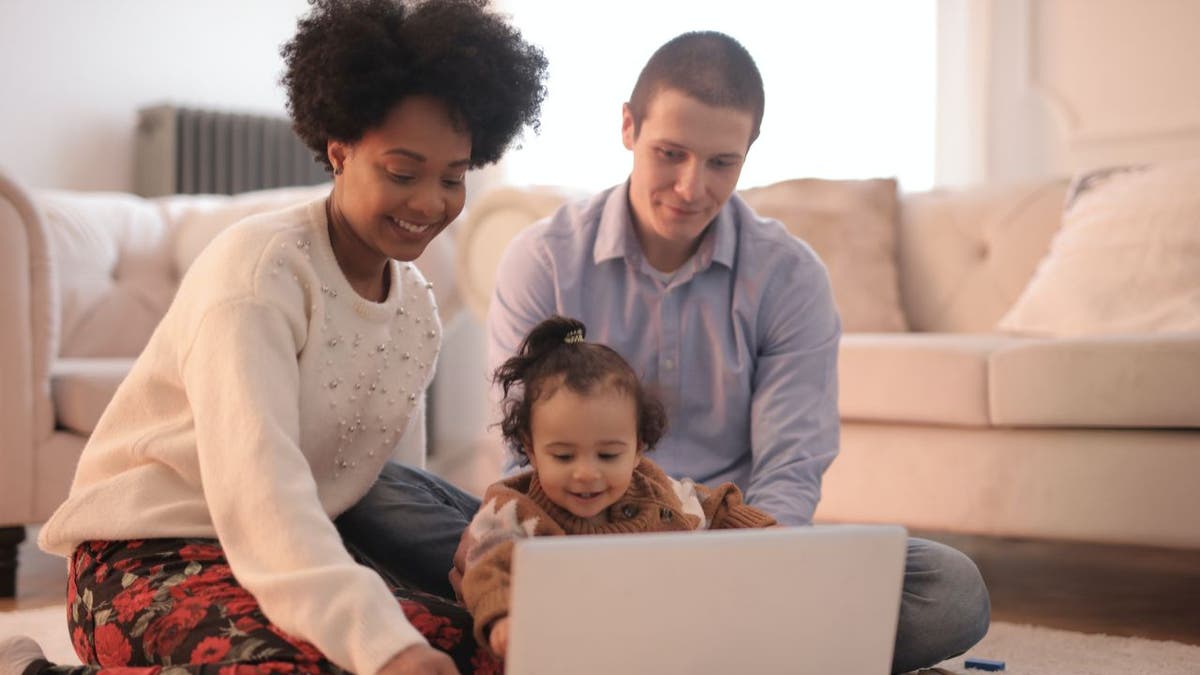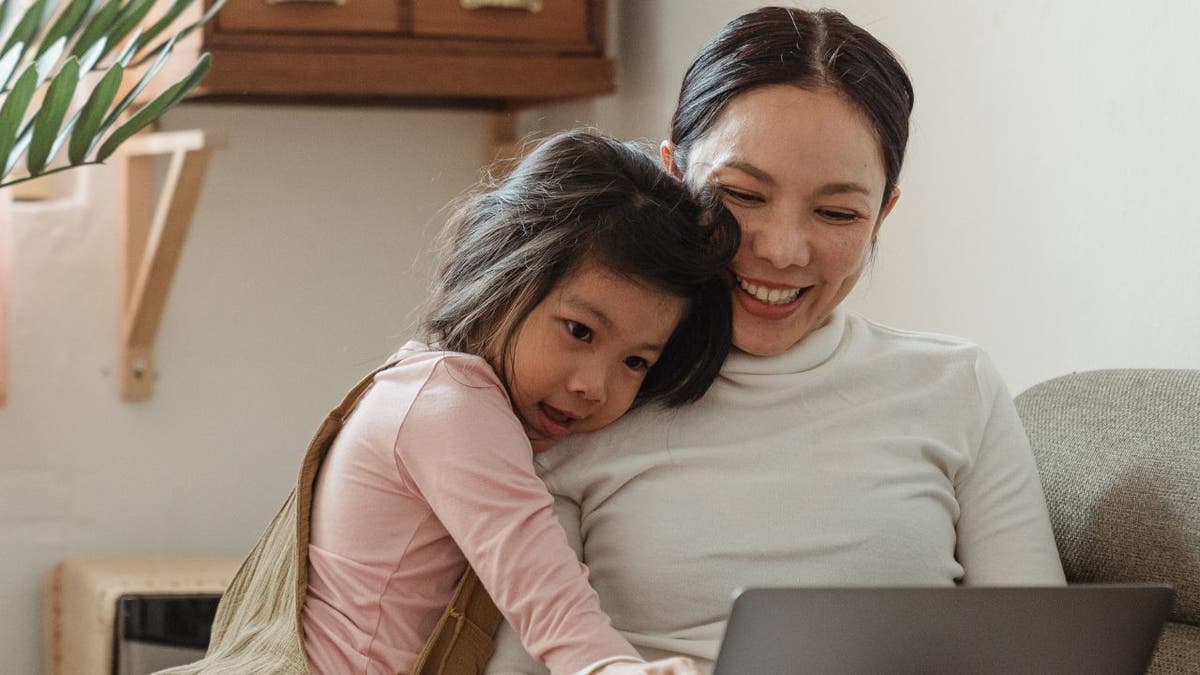
Whether you’re a new parent or a seasoned one, we know how stressful and challenging it can be to raise children in this fast-paced and ever-changing world. Many parents today are looking for ways to leverage technology to enhance their parenting skills and support their children’s development.
Whether it’s homework help, reading recommendations, healthy screen time, social media guidance, or life skills, there’s a tool for that in the world of generative AI. And the best part is, you don’t need to be a tech expert to use them. All you need is a device, an internet connection, and a chatbot named ChatGPT.
CLICK TO GET KURT’S FREE CYBERGUY NEWSLETTER WITH SECURITY ALERTS, QUICK VIDEO TIPS, TECH REVIEWS, AND EASY HOW-TO’S TO MAKE YOU SMARTER

Children receive healthy screen time with parents to enhance their learning experience. (CyberGuy.com)
MORE: BEST ALERTNATIVES TO CHATGPT
What is ChatGPT and how does it work?
ChatGPT is a language model that can generate human-like text responses to a given prompt. It can answer questions, converse on a variety of topics, and generate creative writing pieces.
You can try ChatGPT for free at chat.openai.com. ChatGPT is trained on a massive amount of text data from the internet, so it can learn from the collective wisdom and experience of millions of people. It can also adapt to your preferences and style, and provide personalized feedback and suggestions.

Parents use artificial intelligence to foster curiosity and creativity in children. (CyberGuy.com)
MORE: GOOGLE’S AI IS TRYING TO ONE UP CHATGPT AND BING WITH NEW EVERYDAY AI FEATURES
Can ChatGPT make you a better parent?
Using ChatGPT can have many benefits for both parents and children. Here are some of them:
- It can save time and energy for busy parents who need quick and reliable answers to their parenting questions.
- It can enhance the learning experience for children by providing them with interactive and personalized feedback and suggestions.
- It can foster curiosity and creativity in children by exposing them to a variety of topics and genres.
- It can improve the communication and relationship between parents and children by facilitating meaningful conversations and discussions.
- It can boost the confidence and self-esteem of children by encouraging them to express themselves and explore their interests.
MORE: BEST PROMPTS TO GET THE MOST OUT OF CHATGPT
How to get started with ChatGPT
Getting started with ChatGPT is easy and fun. Here are the steps to follow:
Visit chat.openai.com on your browser. You can use any device that has an internet connection, such as a laptop, tablet or smartphone.
Choose a chat mode from the options available. You can chat with ChatGPT in balanced, creative or precise mode, depending on your preference and purpose.
Type in your name and a greeting message to start the conversation. For example: “Hi, I’m John. I’m a parent of two kids.”
Wait for ChatGPT to respond. It may take a few seconds for it to generate a reply.
Continue the conversation by typing in your queries, comments or requests. You can ask ChatGPT anything related to parenting, education or any other topic you’re interested in.

Some parents have been using ChatGPT to help teach children specific lessons, including math and history. (CyberGuy.com)
GET MORE OF MY SECURITY ALERTS, QUICK TIPS & EASY VIDEO TUTORIALS WITH THE FREE CYBERGUY NEWSLETTER – CLICK HERE
Tips for parents to use ChatGPT
Sure, ChatGPT sounds good in theory, but how do you use it? Here are some concrete examples and suggestions for parents to try out:
Homework help
Simply ask ChatGPT to explain a particular math problem or a confusing historical event. For instance, you could type, “Explain the Pythagorean theorem” or “What led to the American Revolution?” for age-appropriate and detailed explanations.
Reading recommendations
Looking for books that can help nurture your child’s reading habit? Ask ChatGPT for book recommendations based on their age and interests. For example: “Suggest age-appropriate mystery books for a 10-year-old.”
Healthy screen time
If you’re concerned about how much time your kids spend in front of screens, ask ChatGPT for advice on balancing screen time and physical activity. You might type, “How can I limit my child’s screen time effectively?”
Social media guidance
Not sure how to talk to your kids about the potential pitfalls of social media? ChatGPT can help you craft a dialogue. Try asking, “How do I discuss online safety and cyberbullying with my teen?”
Career queries
As your kids approach the age where they’re considering career options, ChatGPT can offer insights into various professions. A query like, “Tell me about careers in STEM,” could yield valuable information to guide your child.
Life skills
Whether it’s budgeting, cooking or basic car maintenance, ChatGPT can offer step-by-step guides for a wide range of essential life skills. Just type in, “How to teach my child to budget” or “Simple cooking recipes for teens.”
Interactive learning
Utilize ChatGPT’s interactive Q&A format for an impromptu quiz session. Questions like, “What’s the capital of France?” or “Who wrote ‘Romeo and Juliet’?” can make learning fun and engaging for your kids.
By integrating ChatGPT into your daily routine, you’re not just throwing a digital lifeline into the chaotic sea of parenting; you’re casting a net to gather the best resources for educating and advising your growing children.
And remember, technology should be a tool, not a crutch – always couple its advice with your own parental wisdom for the best results.

While ChatGPT can be useful for raising children, some parents may be hesitant to rely on it. (CyberGuy.com)
MORE: YOUR SECRETS MAY NOT BE SAFE WITH AI CHATBOTS LIKE CHATGPT
Why parents may choose not to use Generative AI with their children
While the benefits of using generative AI tools like ChatGPT in parenting can’t be ignored, some parents are choosing to tread with caution. Some reasons include:
Concerns Over Dependency: While AI can be a handy assistant, there’s a concern that relying on it too much might hinder a child’s ability to think critically or problem-solve independently. Over time, they might not bother thinking things through challenges on their own. It’s like giving them a calculator before they even try math.
The “Big Brother” worry: As with any internet-connected device or service, there’s always a risk of privacy breaches. Some parents are concerned about the information their children might unknowingly share with chatbots, which could be vulnerable to hacking or misuse.
Machines aren’t people: A machine, no matter how advanced, lacks the human touch. Parents might feel that turning to AI for answers can deprive children of the emotional and nuanced responses that human interactions bring. Genuine human conversations also allow for shared experiences and personal advice that AI can’t offer.
Risk of Misinformation: Even the best AI can get things wrong. Parents are cautious about their kids getting wrong, outdated or even inappropriate info.
By understanding these concerns, parents can make informed decisions about how and when to integrate AI tools into their parenting journey. It’s essential to strike a balance and ensure that technology complements, rather than replaces, the human touch that is so important in nurturing relationships and fostering growth.
Kurt’s key takeaways
ChatGPT is a powerful tool that can assist parents and children in various aspects of their lives. Whether it’s homework help, reading recommendations, healthy screen time, social media guidance, or career queries, ChatGPT can provide relevant and personalized responses.
It can also spark curiosity and creativity in children by generating imaginative and innovative content such as poems, stories, code, essays, songs, celebrity parodies and more.
While AI tools like ChatGPT have parenting benefits, parents worry about over reliance, privacy breaches and impersonal interactions. Balancing tech with human touch is essential in child-rearing.
What do you think? How has technology affected your parenting? Where have you found benefits or issues? Where do you draw the line? Let us know by writing us at Cyberguy.com/Contact
For more of my tech tips and security alerts, subscribe to my free CyberGuy Report Newsletter by heading to Cyberguy.com/Newsletter
Answers to the most asked CyberGuy questions:
Copyright 2023 CyberGuy.com. All rights reserved.

 Latest Breaking News Online News Portal
Latest Breaking News Online News Portal




